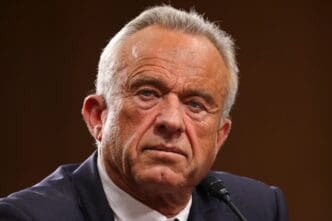The recent endorsement of the measles vaccine by the nation’s top health official, Robert F. Kennedy Jr., has stirred controversy. Despite Kennedy’s previous history of making false claims about vaccine safety, he now supports the vaccine following a measles outbreak in Texas that claimed the life of a second child. However, this shift has raised questions among his anti-vaccine allies, who remain supportive but cautious, interpreting his comments as a nuanced position that balances his agency’s scientific role with anti-vaccine rhetoric. Public health experts note that Kennedy’s choice of words suggests he continues to operate from an anti-vaccine perspective.
The measles outbreak has resulted in over 700 infections nationwide, leading to three fatalities. While Kennedy’s spokesperson insists he is not anti-vaccine and supports vaccination as the most effective preventive measure, his statements have been scrutinized for raising safety concerns. He mentioned that while people should receive the measles vaccine, he opposes mandating it, citing inadequate testing for safety. These comments have been amplified by his allies, who emphasize the need to read between the lines of his statements.
Scientific consensus maintains that the measles vaccine is both safe and crucial for preventing outbreaks, with experts highlighting the need for near-universal vaccination to protect communities. Despite this, vaccination rates among young children in the U.S. have fallen below the necessary threshold, leaving certain areas susceptible to infectious diseases.
Kennedy’s handling of the issue has led to further controversy, especially his comments regarding the deaths during the outbreak. He suggested that the fatalities were due to underlying conditions rather than measles itself, contradicting health officials’ reports. His remarks have been used by anti-vaccine groups to fuel doubts about vaccine safety, despite scientific evidence that pneumonia, often resulting from measles, is a common cause of death in young children.
In the wake of these events, Kennedy has faced criticism from former allies for his statements supporting the measles vaccine, even as he attended the funeral of a child who died from the disease. While he emphasized the efficacy of the MMR vaccine, his association with the families of the deceased has been interpreted as a stance supporting personal choice over mandatory vaccination. This approach aligns with the narrative that frames the anti-vaccine movement as a matter of personal rights and freedoms, a perspective that experts argue overlooks the broader public health implications.
The Societal Shift
The conversations surrounding Robert F. Kennedy Jr.’s stance on vaccines reflect a broader societal tension between individual freedoms and public health responsibilities. His comments have the potential to influence individuals who are already skeptical of vaccinations, further complicating efforts to maintain high immunization rates necessary for community protection. This narrative of personal choice over collective safety can lead to lower vaccination rates, increasing the risk of outbreaks and putting vulnerable populations at greater risk.
For communities, particularly those with low vaccination rates, Kennedy’s mixed messages could perpetuate misinformation, leading to hesitancy and resistance against vaccinations that are proven to save lives. This, in turn, could strain public health resources and pose significant challenges in managing preventable diseases. The emphasis on individual freedom without considering the impact on community health could undermine efforts to ensure widespread protection against contagious diseases, highlighting the need for clear and consistent public health messaging.








